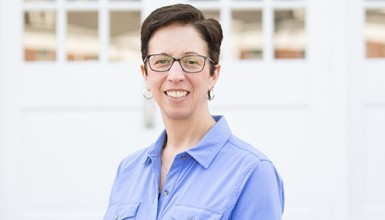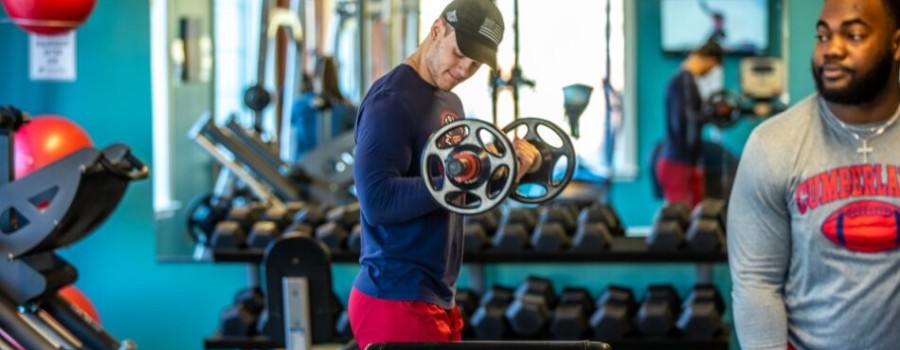When exercise meets expertise, anything is possible.
As an exercise and sport science degree major at University of the Cumberlands, you’ll be learning from professors who are committed to helping you achieve your academic and career goals. In this bachelor's exercise and sports science degree program, you can tailor your course studies in exercise physiology, biomechanics, sports psychology, among others, to your personal interests while building a strong academic foundation that’ll equip you to help others live their healthiest lives. From pursuing a strength-training career in the multi-billion sports industry to leading fitness classes in community centers, the exercise and sport science degree program will prepare you for any fitness career that comes your way – from sports medicine to athletic training and much more.
By the Numbers
Programs & Requirements
* The credit hours listed on this page only reference the specific program requirements and is not reflective of the total hours necessary to receive your degree. Cumberlands requires all students obtain a minimum of 60 hours for an associate’s degree and a total of 120 hours for a bachelor’s degree. Transfer and prior learning credits may be counted toward those totals.
To learn more about our General Education Requirements, please visit the page referenced below or explore our Academic Catalog.
Bachelor of Science in Exercise and Sport Science
Through a bachelor’s degree in exercise and sport science, you will gain a thorough, well-rounded education about all facets of the sport science field, giving you knowledge and professional skills that will help you succeed in almost any career. With your sport and exercise science degree, you’ll also be likely to achieve better – and higher-paying – career opportunities down the line. As they say, “If you haven’t got your health, you haven’t got anything.” Learn how to improve your own health while receiving training to help improve the health of those around you.
Course Requirements
- ESS 131 - Introduction to Health, Exercise and Sport Science
- ESS 330 - Kinesiology
- ESS 334 - Methods of Group Exercise
- ESS 336 - Exercise Prescription
- ESS 435 - Physiology of Exercise
- ESS 437 - Tests and Measurements
- HESS 233 - Functional Human Anatomy and Physiology
- HESS 330 - Influences on Contemporary Issues in Health and Performance
- HESS 333 - Nutrition
- HESS 403 - Behavior Change for Lifestyle Wellness
- ESS 490 - Strategies and Practices for Fitness Professionals
A Bachelor of Arts requires all the same courses as a Bachelor of Science with the addition of four classes (12 hours) in a foreign language.
Choose one foreign language sequence:
- FREN 131 Elementary French I
- FREN 132 Elementary French II
- FREN 231 Intermediate French I
- FREN 232 Intermediate French II
- SPAN 131 Elementary Spanish I
- SPAN 132 Elementary Spanish II
- SPAN 231 Intermediate Spanish I
- SPAN 232 Intermediate Spanish II
Minor in Exercise and Sport Science
Even a minor in exercise and sport science will give you valuable fitness knowledge and professional skills that will elevate your job performance and land you better – and higher-paying – careers in the future. Everyone benefits from improving their health. Why not learn the basics of how to do that?
Course Requirements
- ESS 131 - Introduction to Health, Exercise and Sport Science
- ESS 330 - Kinesiology
- ESS 334 - Methods of Group Exercise
- ESS 336 - Exercise Prescription
- ESS 435 - Physiology of Exercise
- ESS 437 - Tests and Measurements
- HESS 233 - Functional Human Anatomy and Physiology
- HESS 330 - Influences on Contemporary Issues in Health and Performance
Associate of Applied Science in Exercise and Sport Science
With an Associate of Applied Science in Exercise and Sport Science, your courses will focus on specific industry skills. Taking less time to complete than a bachelor’s degree, an associate degree is an excellent way to start your professional career faster and more cost-effectively while still helping you gain the skills and experience necessary for a career in the field. And for those already working in the field of exercise and sport science, a degree program offers you extra information you may not have known you needed and a degree to prove your fitness knowledge to future employers. No matter your life circumstance, an associate degree could be the perfect step forward for you.
Take the Next Step
Mission & Goals
The mission of the Department of Health, Exercise, and Sport Science (HESS) is to develop competent exercise science majors who integrate content knowledge and practical application skills appropriate to diverse situations.
Exercise and Sport Science Careers & Outcomes
*All statistics from the U.S. Bureau of Labor and Statistics
Fitness Trainer: $40,700
Fitness Trainer: $40,700
Fitness trainers and instructors lead, instruct, and motivate individuals or groups in exercise activities.
Coach: $38,970
Coach: $38,970
Coaches teach amateur or professional athletes the skills they need to succeed at their sport. Scouts evaluate athletes as possible recruits.
Scout: $38,970
Scout: $38,970
Evaluate athletes as possible recruits.
Postsecondary Instructor: $79,640
Postsecondary Instructor: $79,640
Postsecondary teachers instruct students in a variety of academic subjects beyond the high school level.
Fitness Equipment Sales Manager: $127,490
Fitness Equipment Sales Manager: $127,490
Sales managers direct organizations' sales teams.
Camp Activities Instructor/Director: $29,680
Camp Activities Instructor/Director: $29,680
Design and lead sports-related activities to help keep your camp attendants happy, active, and healthy.
Common Questions
An exercise and sports science degree is a program that combines your passion for sports with critical analytical, evaluative, and management skills. In this program, you’ll study areas like exercise physiology, biomechanics, and sports psychology, all designed to equip you with the knowledge to help others achieve their healthiest lives. Graduates can pursue careers ranging from strength training in the sports industry to leading community fitness classes.
An exercise and sports science degree typically takes four years to complete if pursued as a full-time bachelor’s program. This duration includes fulfilling general education requirements alongside your major-specific courses. Transfer credits and prior learning can potentially shorten this timeline.
Yes, you can earn an exercise and sports science degree online. Many institutions, including University of the Cumberlands, offer flexible online options that allow you to complete the program at your own pace while still receiving the same quality education as on-campus students.
An exercise and sports science degree is worth it if you are passionate about fitness, health, and sports. The degree prepares you for various rewarding careers in the growing fitness industry, with opportunities in areas such as sports medicine, athletic training, and fitness coaching. The skills and knowledge gained are applicable in numerous professional settings, making it a valuable investment in your future.
With an exercise and sports science degree, you can pursue various careers, including becoming a fitness trainer, coach, or athletic scout. Other opportunities include roles as a postsecondary instructor, fitness equipment sales manager, or camp activities instructor/director. This degree opens doors to diverse positions within the fitness and sports industry.
To get an exercise and sports science degree, you need to enroll in a bachelor’s program at a university that offers this major. You’ll complete courses in areas like exercise physiology, biomechanics, and sports psychology, alongside general education requirements. Some programs also offer online study options, making it easier to balance your education with other commitments.
Whether it's better to major in kinesiology or exercise science depends on your career goals. Kinesiology typically focuses more on the study of body movement and may be broader in scope, while exercise science is more specialized in areas like sports performance, fitness, and health. Both degrees offer valuable skills, but your choice should align with your specific interests and career aspirations.
Yes, exercise and sport science can be considered a STEM field as it involves the scientific study of human movement, exercise physiology, and biomechanics. These areas rely on the application of science, technology, engineering, and mathematics principles, making the degree relevant to STEM education.
Exercise and sports science can be a challenging degree as it involves a blend of rigorous scientific study and practical application. Courses in biomechanics, exercise physiology, and sports psychology require a solid understanding of complex concepts, but with dedication and passion for the field, it is manageable and rewarding.
Faculty Experts in Exercise, and Sport Science
Learn more about the professors you will interact with in the Department of Health, Exercise, and Sport Science (HESS)

Julia Chaney

Dr. Elizabeth Christopher
Dr. Elizabeth Christopher
Contact Information

Heather Killian
Request Information
Learn more about all that Cumberlands has to offer.

